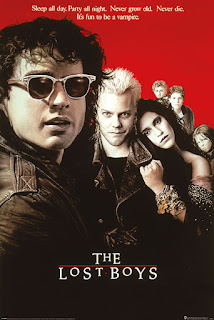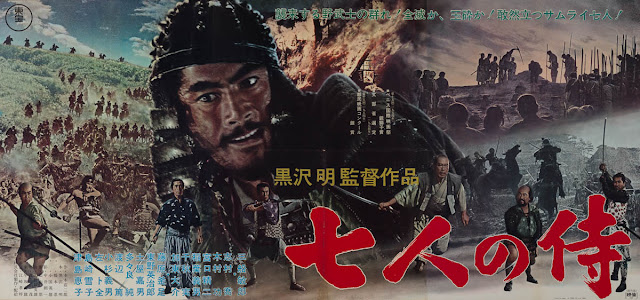Back to the 80s 2: The Lost Boys (Dir Joel Schumacher, 1h39m, 1987)
There's something about the 1980s. If, like rock music, the 1960s was the era of refinement, of experimentation, of a message found and lost and found again, and the 1970s saw it refract and sharpen into urbanite, and heavier and stranger strands and back to basics reawakenings, so the 1980s is the era of maximalism, of excess, and a sensibility, a tone, a feeling that, thirty-four to forty three years later, hang heavy over their respective mediums. It is the decade where the blockbuster came of age, where the sequelisation of cinema became part of its rude mechanics, and where fantasy and science fiction moved from cult to childhood favourites.
We begin though, in cinema's backyard, in California, with one of cinema's great masters of style breathing new life into the vampire legend. We begin with The Lost Boys, Joel Schumacher's slick vampiric teen flick, in which a pack of eternally young vampires, including Kiefer Sutherland's David, stylishly haunt the night of California, preying upon the young and attractive, until they meet their match in a duo of brothers, Michael and Sam (Jason Patric and the late Corey Ham), and their unlikely allies, matching earnest comic hijinks, the stunningly undead, and that yearning of endless youth that has underpinned the Nosferatu in cinema and beyond ever since.
The Lost Boys begins as one of those potent cinematic recipes common-place in the 1980s-add, in this case, JM Barrie's Peter Pan to the increasingly popular Interview with a Vampire by Anne Rice-no decade in cinema has been as focused on the teenage experience as the 1980s, and matching the never-aging youth of Lestat and Louis to the roving ageless Lost Boys of Pan is already a heady mix, and a perfect tool to critique 80s teenagerdom. However, here, the cook changes-original director Richard Donner, straight off the charming 80s adventure stalwart, The Goonies, was too busy to direct, and with his replacement, Joel Schumacher, so the tween vampire killers, and their immortal nocturnal adverseries were aged up into young adults, the same aesthetic considerations that had made St Elmo's Fire (1984) a hit among young audiences now brought to bear on the gothic.
Gothic is certainly the tone that pervades the opening moments of The Lost Boys: the camera sweeps in over the moonlit waves, to the strains of Gerard Mann's peak 80s dry ice, choir and drum machine-inflected "Cry Little Sister", the gothic overtones practically dripping out of the screen onto your sneakers. Thus, against this jet black background, this flexing of aesthetic consideration, this perfect tonal encapsulation of the dark and mysterious, Schumacher introduces the boardwalk and amusement arcades of Santa Carla, California, and the vampiric gang that haunt it, stepping into view around a carousel to instantly pick a fight and be accosted by the local security guard, whom they later kill-it's a perfect introduction, the predatory slink, the swathe of New Romantic and alternative fashion marking this quartet out from those around them. Chief of these is David, (Sutherland), who Schumacher and cinematographer, Michael Chapman (the man who shot Raging Bull and Taxi Driver), imbue with both a gothic presence, and a puckish sensibility.
Against this, to the dulcet tones of Echo and the Bunnymen covering The Doors, we are introduced to our twp heroes, Michael and Sam, alongisde their mother, moving in with her eccentric father in the dead-end town of Santa Carla, omniously described as the Murder Capital of the world, the film showing us, with impressive cinematic brevity, a cross-section of the city's population, before both brothers quickly encounter the strange and unusual underbelly of the city. Michael quickly strikes up a friendship with Star, who is quickly revealled to be one of the Lost Boys' gang, and is quickly brought into their circle, hazed by the group, and given blood to drink, thus beginning his transformation into a vampire. Sam, meanwhile, meets up with the comic-store owning, occult-obssessed Frog Brothers (Corey Feldman and Jamison Newlander), who soon confide in the younger brother that they believe the town to be infested with vampires.
It is here that the film essentially become two; we follow Michael as he hangs out with the increasingly otherworldly Lost Boys, as they dangle from the underside of railway bridges and menace passerbys, and as Michael begins to realise he is no longer human, sleeping for most of the day, his reflection becoming transparent in an an impressive effect, and battling the increasing desire to drink his brother's blood in tense scenes. The Michael half of the film is a film in which chararacters that typify the 1980s obsession with young and beautiful people, complete with icon of Jim Morrison that looms over the dilapidated hotel in which the Lost Boys live, slowly reveal what they are, to spectacular effect, thanks in part to the atmosphere, the spell that the film has woven,so that the audience have pieced it together long before Michael has, and in part down to, well, spectacular effects, the beautiful young things becoming monstrous and uncanny as they reveal their true nature to Michael.
At the other pole, The Lost Boys takes its cake and eats it-it twins its dark gothic drama with a charming, if offbeat teen adventure film via Sam, as he, and the Frog brothers attempt to track down the head of the vampires, in a section of the film that captures the spirit of the mid 1960s teen flicks that the original film's script hinted at. Moreover, as the trio have to unmark the head of the vampires, and match wits with his underlings, as well as fending off Michael's own battles with vampirism, and the Lost Boys, so the film takes on a surprisingly blackly comic bent, that darkly gothic sensibility alongside a comic action adventure romp giving the film an enjoyably off-kilter sensibility, a perfect and rarely copied melding of the two great schools of 80s cinema.
What The Lost Boys is, above all, is the revitalisation of the vampire myth, the vampire not as aged or fragile blood=sucker, but as cool, charismatic, and attractive seducer, the vampire as counter cultural figure, the vampire as cool youth. Its impact remains to this day, but The Lost Boys remains a slickly made gothic ride of a film, one of cinema's great offbeat directors at his very best and most stylish.
Rating: Highly Recommended
Next week, we stay in the
1980s-or should that be the 1950s? as we go Back to the Future, in one of the greatest family films of the entire decade
Support the blog by subscribing to my Patreon from just £1/$1.00 (ish) a month to get reviews up to a week in advance and commission your very own review! https://www.patreon.com/AFootandAHalfPerSecond.



Comments
Post a Comment